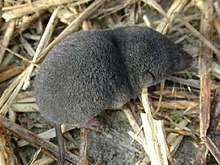American short-tailed shrew
The genus Blarina is a group of relatively large shrews with relatively short tails found in North America. They have 32 teeth and are in the red-toothed shrew subfamily.
"Blarina" redirects here. For the fictional species from Star Wars, see List of Star Wars species (A–E) § Blarina.
| American short-tailed shrews[1] Temporal range: Late Pliocene to Recent | |
|---|---|
 | |
| Southern short-tailed shrew (Blarina carolinensis) | |
| Scientific classification | |
| Kingdom: | Animalia |
| Phylum: | Chordata |
| Class: | Mammalia |
| Order: | Eulipotyphla |
| Family: | Soricidae |
| Tribe: | Blarinini |
| Genus: | Blarina Gray, 1838 |
| Species | |
They generally have dark fur and thick feet. The saliva of these animals is toxic and is used to subdue prey.[2]
The list of species is:[1]
- Northern short-tailed shrew B. brevicauda
- Southern short-tailed shrew B. carolinensis
- Elliot's short-tailed shrew B. hylophaga
- Everglades short-tailed shrew B. peninsulae
Ecoepidemiology
Short-tailed shrews are one of the animal-reservoirs of the agents of Lyme disease and human babesiosis.[3]
References
- Hutterer, R. (2005). Wilson, D.E.; Reeder, D.M. (eds.). Mammal Species of the World: A Taxonomic and Geographic Reference (3rd ed.). Johns Hopkins University Press. pp. 269–270. ISBN 978-0-8018-8221-0. OCLC 62265494.
- Kita M, Okumura Y, Ohdachi SD, Oba Y, Yoshikuni M, Nakamura Y, Kido H, Uemura D (February 2005). "Purification and characterisation of blarinasin, a new tissue kallikrein-like protease from the short-tailed shrew Blarina brevicauda: comparative studies with blarina toxin". Biological Chemistry. 386 (2): 177–82. doi:10.1515/BC.2005.022. hdl:2115/7398. PMID 15843162.
- Telford III, S. R., Mather, T. N., Adler, G. H., & Spielman, A. (1990). Short-tailed shrews as reservoirs of the agents of Lyme disease and human babesiosis. The Journal of parasitology, 681-683 (abstract)
| Taxon identifiers |
|---|
This article is issued from Wikipedia. The text is licensed under Creative Commons - Attribution - Sharealike. Additional terms may apply for the media files.